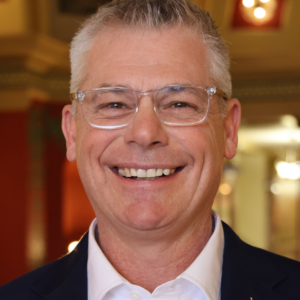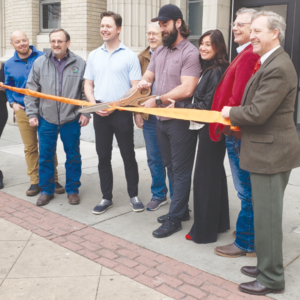By Evelyn Pyburn
Sophisticated- analytical testing results from a rare earths mineral deposit in southwestern Montana are nothing less than “transformational from a United States government and world perspective,” stated a very enthusiastic Harvey Kaye, adding that the technology that the mineral exploration and technology development company, US Critical Materials, is developing in collaboration with the Idaho National Laboratory (INL) can be just as transformational to the industry.
US Critical Materials, a Nevada -based company with corporate headquarters in Salt Lake City, Utah, announced almost three years ago their discovery of high grade rare earth minerals at Sheep Creek near Darby, Montana. Even then, company representatives were quite excited about what they suspected to be the superlative quality of their find, which has since been independently confirmed.
Results from Activation Labs (actlabs.com), an independent geochemical and geo-metallurgical analysis lab, confirm that Sheep Creek holds the highest reported grades of any known deposit in the United States, along with the highest concentrations of gallium—a material essential to national security. “The US Critical Materials deposit in Montana has sufficient rare earths and gallium to provide the world with the critical elements it needs to help meet demand well into the future,” stated Harvey Kaye.
Kaye and Ed Cowle, both directors of US Critical Materials, announced the company’s recent exciting developments in an interview with the Big Sky Business Journal.
US Critical Materials mineral claims in Ravalli County, Montana cover approximately 10 square miles. The initial 800-acre site contains over 60 carbonatite formations, which have the potential of holding more rare earth minerals at depth, underscoring Sheep Creek’s vast potential.
With grades approaching 9% (89,932 ppm) and combined neodymium and praseodymium concentrations of 2.4% (23,810 ppm), Jim Hedrick, President of US Critical Materials, and the former Rare Earth Commodity Specialist at the US Geological Survey (USGS), said, “US Critical Materials has higher rare earth grades than those found in Greenland and Ukraine. . . Recent discussions have highlighted US interest in Ukraine’s and Greenland’s rare earth deposits. However, according to data from each territory’s official Geological Surveys, Sheep Creek’s rare earth grades exceed known deposits in these two areas. Furthermore, the scientific verification of Sheep Creek’s mineral content is more comprehensive and precise than in Greenland or Ukraine.”
“Over my 30+ year career evaluating properties for the U.S. government, I have never encountered a deposit with the high rare earth and gallium grades being generated at Sheep Creek,” stated Jim Hedrick.
Another advantage of the Sheep Creek rare earth mineralization is the unusually low levels of thorium, a radioactive element often associated with rare earths deposits that require special permitting, extra processing steps, and disposal protocols.
“The high-grade rare-earth indications together with the low thorium readings are a unique combination,” stated Cowle.
Rare earth minerals (REM) and gallium are crucial elements for almost every technology in the future but especially for national defense, a growing concern since the US has few domestic sources for rare earth metals, and imports about 80 percent of what it needs from China. Recently China began to weaponize its control of rare earths and rare earths processing, and in the past year has banned the export of gallium, germanium, and antimony, to the United States.
The U.S. Department of Defense (DoD) uses rare earth elements for a variety of purposes in its weapon systems – in radar, guidance systems, precision-guided munitions, lasers, satellites, and equipment including night vision goggles, yet mostly depends on China for its supply.
Rare Earths are also essential for the production of a full range of industrial and consumer goods including batteries, mobile phones, laptops, hard drives, lasers, electric vehicles, semiconductors, computer chips, 5g technology, solar panels, wind turbines and medical diagnostic devices.
Emphasizing Montana’s historic role as the “Treasure State,” Kaye said the discovery of rare earth metals and gallium heightens that status. Sheep Creek will be a better resource for the US because of its accessibility and higher critical mineral grades.
Montana, declared Kaye, will be “the point of the spear for national defense.”
According to Cowle, “Sheep Creek contains at least thirteen of the critical risk elements defined by the US Geological Survey. The key elements identified include neodymium, praseodymium, and gallium. The Properties also contain cerium, dysprosium, europium, gadolinium, lanthanum, niobium, scandium, strontium, barium and gallium.”
Gallium is not technically a rare earth mineral but it is rare. Gallium is defined as a critical mineral. In fact, the US is entirely dependent on imports for it, and it is vital to high-performance chips, which are foundational to semiconductors, 5G technology, smartphones, satellite systems, medical diagnostics and therapeutics, and next-generation defense platforms.
The measured gallium grades at Sheep Creek range from 180 to 385 ppm— far exceeding the 50ppm that the U.S. had been importing, predominantly from China.
The Sheep Creek project represents the nation’s only viable domestic gallium initiative, providing a pivotal opportunity to secure and stabilize the U.S. supply of the mineral.
Since their initial announcement in 2022, US Critical Materials entered into a Cooperative Research and Development Agreement (CRADA), with the Idaho National Laboratory (INL) to develop a new technology to extract the minerals from the ore with the least environmental impact possible. Kaye emphasized that US Critical Materials is focused upon future mineral extraction in the most environmentally sensitive way possible – “We don’t want to create environmental problems, we want to solve them,” he said.
Most recently, the company has extended its cooperative agreement with INL through February 2027.
The new technology which is being developed is called “Electrochemical Extraction and Purification.” The process is expected to extract gallium and the full spectrum of rare earth critical minerals from the ore through use of a novel Electrochemical Membrane Reactor (EMR). It will, in fact, be adaptable and useful for the recovery of many value-added metals. The proposed EMR consumes only electricity, water and nitrogen. Chemical and waste generation are anticipated to be dramatically reduced, while also reducing costs.
US Critical Materials plans to file national and international patents on the new technologies. They plan to license this cutting- edge technology to other deposits in the United States and friendly countries, which will give the U.S. a strong “bargaining chip” in its desire to work with overseas critical mineral deposits.
AI (artificial intelligence) and geophysics plays a significant part in the exploration of the Sheep Creek project. US Critical Materials engaged aerial services to gather a wide range of geographical data over the 6700 acres of mineral claims that US Critical Material owns at Sheep Creek. That data was then be analyzed by AI to determine the geographical characteristics of the initial 800 acre, and then applied to the rest of the property to identify other potential sites worthy of exploring. The process identified an additional 30 areas that can be developed over time.
Another aspect of Sheep Creek that makes it so extraordinary is that the rare earth deposits are concentrated in “tight veins.” The reality is rare earth metals are not so rare – they can be found in many places but seldom in quantities that make them economical to mine. And, usually when they are found in productive quantities they are broken up and scattered which requires digging large pits and processing tons of material to gather the ore.
And more for Sheep Creek – the geophysical and AI data suggests that there may be a continuous source of ore deeper in the earth from which the “tight veined” outcrops extend. The project includes three adits or tunnels that were developed in the late 1950’s for niobium mineralization by the Continental Columbium Company. These adits go as deep as 450 feet below the surface. They provide a visual “window” into the deposit—at depth. Sampling of minerals in the adits has shown high grade rare earths and critical minerals
“We don’t anticipate doing any open pit mining,” said Kaye.
According to Cowle, US Critical Materials will be completing a form, SK-1300, within the next 60 days. This is a Securities and Exchange document which will include, among other things, a third party resource estimate valuing the minerals found at Sheep Creek. The company also expects to file a Plan of Operation with the US Forest Service in the second quarter of 2025 . The Plan of Operation will include drilling sites that the company would like to have permitted for exploratory drilling. The company does not have control over when the Plan of Operations would be approved and drilling permitted.
If the drilling results are positive, US Critical Materials will search for a joint venture partner to file for a mining permit. US Critical Materials is an exploration and technology development Company, and not a mining company. Management would seek an established mining company, or possibly an end user of rare earths to file for a mining permit. “We would like to establish a joint venture with a major mining company or an end user– some of which are already investing directly in US or overseas mining projects,” stated Cowle.
Although difficult to estimate regulatory time horizons, US Critical Materials believes that the timing of their domestic critical minerals project could not be better.
There are only two active rare earth mining projects in the world outside of China: MP Materials in California, and Lynas in Australia.
US Critical Materials has substantial mineral holdings in Montana and Idaho. A company press release states that the company is “dedicated to securing a domestically sustainable, high-grade supply of rare earth elements and gallium, reducing US reliance on imports, and ensuring a stable, independent supply chain for national security. We are currently utilizing and developing multiple environmentally friendly technologies for the exploration and processing of rare earths and critical minerals.”







